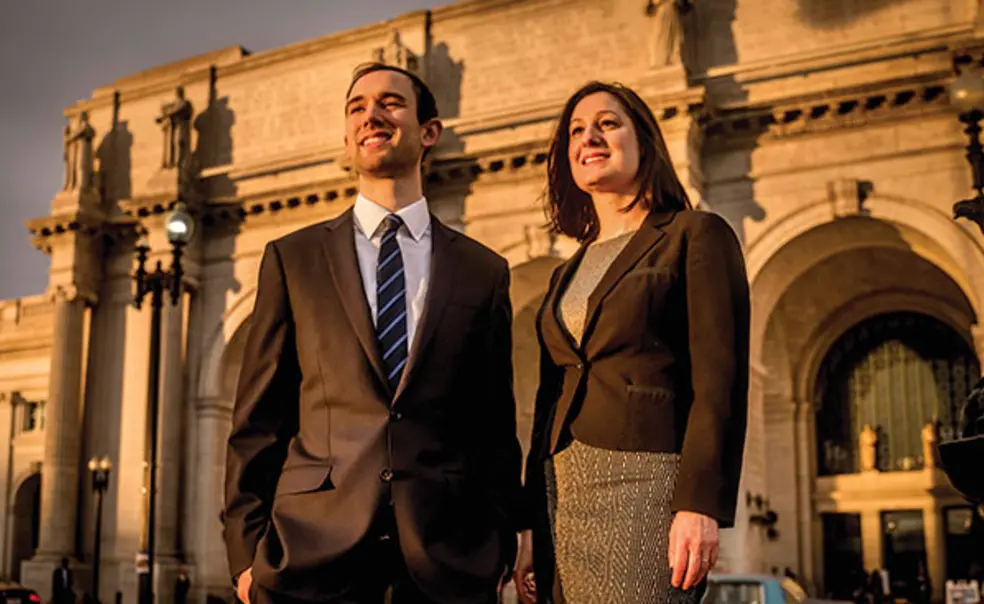Ted Callon ’17 and Maia Jachimowicz *08: Seeking an End to Cash Bail
Philadelphia Bail Fund sets out to reform the bail system, with the aim of reducing inequality
Bail is supposed to work like an insurance policy for justice: People pay bail and are reimbursed for showing up at their court date. In Philadelphia, once bail is set, a person must pay a portion of it in order to be released from jail; after showing up in court, that person is reimbursed, minus fees. If he or she can’t come up with the money, they’re detained until trial. This system, with origins as far back as the Middle Ages, is one that many see as unjustly harming the poor.
“Our criminal-justice system is supposed to work on the principle that you are innocent until proven guilty,” says Ted Callon ’17, a politics major living in Washington, D.C., who just finished an internship with Rock the Vote, a nonprofit organization that promotes voting among young adults.
Callon and Maia Jachimowicz *08, a Woodrow Wilson School M.P.A. and former policy director for Philadelphia’s last mayoral administration, helped form the Philadelphia Bail Fund in 2017 to protest the city’s bail system. Along with two other co-founders, they raised $50,000 in less than two months to bail out about a dozen indigent people as an initial pilot program. The Philadelphia Bail Fund requires that individuals for whom they post bail must be assigned a public defender by the court because they cannot afford their own lawyer.
“There’s so much hardship that happens to people when they are held in pretrial detention simply [because] they can’t afford bail,” says Jachimowicz, who serves as president of the Philadelphia Bail Fund board of directors and also as vice president for evidence-based policy implementation at Results for America, an advocacy organization. “[People] can lose their job, they can lose their home, they can lose custody of their children. It clearly puts an immense strain on family relations.”
Philadelphia has the fourth-highest rate of pretrial incarceration among urban counties in the country. About 1,700 people — a quarter of the city’s inmates — are being held because they haven’t paid bail, according to Julie Wertheimer, chief of staff of criminal justice in Philadelphia’s managing director’s office.
In 2016, the city received a $3.5 million, two-year grant from the MacArthur Foundation “to address over-incarceration by reducing jail misuse and overuse.”
“We want to bail out individuals as soon as possible,” ideally before people are moved from their holding cells, says Callon, whose interest in the criminal-justice system was sparked by a class he took at Princeton called “The New Jim Crow: U.S. Crime Policy from Constitutional Formation to Ferguson,” taught by associate professor Naomi Murakawa. “The first three days [in jail] have such a large impact on individuals ... things as serious as suicide rates are incredibly high in those days.”
The ultimate goal of the Philadelphia Bail Fund is to not exist.
“We don’t want to be here in 20 years,” says Jachimowicz. “Our goal is in five to 10 years — that the bail system in Philadelphia has been reformed.”
The Philadelphia Bail Fund is not alone in its quest to change the current bail system. Philadelphia Community Bail Fund is primarily focused on posting bail for black mothers, and bail funds have been established in several other cities. In 2014, voters in New Jersey amended the state constitution to overhaul its bail system.
“The movement for cash-bail reform is definitely growing,” says Callon. “We can be a part of that, which is fantastic.”
UPDATE, Feb. 2, 2018: Just as the magazine was being mailed, PAW received the following email from Ted Callon ’17:
“We are excited to share some great news from the Philadelphia Bail Fund. Yesterday, after months of preparation, we were able to secure freedom for our first client: an employed mother of two with another child on the way.
“Our client was detained for nearly sixteen hours and could not afford to pay bail, but thanks to donor support, she is now home with her children and family instead of awaiting trial in Philadelphia’s Riverside Correctional Facility.
“In Philadelphia, a person who cannot afford to pay bail will be detained in a city jail for an average of 101 days. By posting bail for our client, we gave her and her family that time back — time to be together, time to take care of her health, time to work, and time to prepare for her trial from a position of freedom. We also saved the city government the costs of detaining her pretrial.”












2 Responses
Emil M. Friedman *73
7 Years AgoIf Cash Bail Ends ...
Ted Callon ’17 and Maia Jachimowicz *08 seek an end to the cash bail system (Princetonians, Feb. 7). With what do they propose replacing it? How will society ensure that the accused return for trial? Would GPS anklets for all pretrial defendants be logistically viable?
Norman Ravitch *62
8 Years AgoIf we executed more vicious...
If we executed more vicious criminals, we could reduce the populations in jails and deter more crime. Criminals cannot be rehabilitated if they have committed heinous crimes; they can only be sent to their eternal reward. Don't worry about bail.